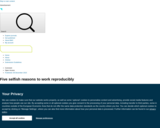
And so, my fellow scientists: ask not what you can do for reproducibility; ask what reproducibility can do for you! Here, I present five reasons why working reproducibly pays off in the long run and is in the self-interest of every ambitious, career-oriented scientist.A complex equation on the left half of a black board, an even more complex equation on the right half. A short sentence links the two equations: “Here a miracle occurs”. Two mathematicians in deep thought. “I think you should be more explicit in this step”, says one to the other.This is exactly how it seems when you try to figure out how authors got from a large and complex data set to a dense paper with lots of busy figures. Without access to the data and the analysis code, a miracle occurred. And there should be no miracles in science.Working transparently and reproducibly has a lot to do with empathy: put yourself into the shoes of one of your collaboration partners and ask yourself, would that person be able to access my data and make sense of my analyses. Learning the tools of the trade (Box 1) will require commitment and a massive investment of your time and energy. A priori it is not clear why the benefits of working reproducibly outweigh its costs.Here are some reasons: because reproducibility is the right thing to do! Because it is the foundation of science! Because the world would be a better place if everyone worked transparently and reproducibly! You know how that reasoning sounds to me? Just like yaddah, yaddah, yaddah …It’s not that I think these reasons are wrong. It’s just that I am not much of an idealist; I don’t care how science should be. I am a realist; I try to do my best given how science actually is. And, whether you like it or not, science is all about more publications, more impact factor, more money and more career. More, more, more… so how does working reproducibly help me achieve more as a scientist.
- Subject:
- Applied Science
- Life Science
- Physical Science
- Social Science
- Material Type:
- Reading
- Author:
- Florian Markowetz
- Date Added:
- 12/08/2015